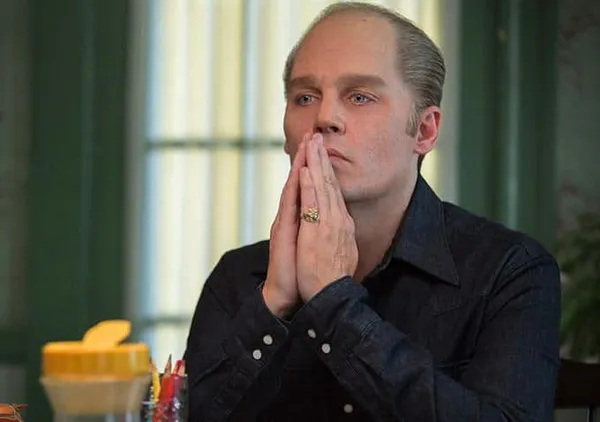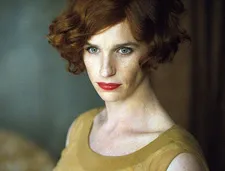 |
| Johnny Depp as Jimmy “Whitey” Bulger in Black Mass - "Depp captures this simmering psychosis with seemingly very little effort" |
After Gravity and Birdman, hopes were high that the 72nd Venice Film Festival would make it three for three with this year’s one-word opener Everest. Instead, the mountain drama didn’t quite hit the spot, satisfying the local media’s thirst for star wattage but drawing mostly mildly positive reviews. One has to wonder why Scott Cooper’s Black Mass wasn’t in that slot, a slick and very precisely arranged crime feature that pulls the remarkable trick of delivering mainstream gangster movie thrills without joining the legions of Goodfellas wannabes.
The casting of Johnny Depp as the blue-eyed Jimmy “Whitey” Bulger is a bold move, and, though relatively subtle, his make-up is initially jarring. Cooper, however, has a good eye for supporting faces, and as we delve deeper into the underworld of Boston’s South Side, Depp’s angular, birdlike features suddenly don’t seem so out of the ordinary. Like Friedkin’s French Connection, but without the reckless adrenaline, Black Mass tilts at the structure of modern crime, charting how Bulger rose from petty hood status to kingpin by using his connections with the FBI to create a cloak of invisibility.
Bulger’s nerve was and remains breathtaking; this is a man who terrified his friends into silence and silenced his enemies with anything that came to hand. Remarkably, though, Depp captures this simmering psychosis with seemingly very little effort; his Bulger is smart and slippery, and as he reaches his epic criminal peak, the film becomes more intimate. Helping to sell the sense of paranoia is Joel Edgerton as FBI man and childhood friend John Connolly, who reels in Bulger to help nail the mafia and then lets him run riot. Depp may have the showier turn but Connolly is the film’s essence: this is not a story about good versus evil, more a story about the way the not-so-good allows evil to flourish.
 |
| Rachel McAdams, Michael Keaton and Mark Ruffalo in Spotlight. |
But what sounds sizzling in print is very dull on screen, much like the recent Fifth Estate, Spotlight fails to make journalism even the slightest bit exciting. Walk-and-talks are conducted in the bowels of a printing factory, and one lucky actor even gets to phone in his performance, as the rest of the cast listen, spellbound, on speakerphone. Disappointingly for McCarthy, there are no memorable characters and very few standout scenes, just lots of exposition, running around (Mark Ruffalo’s reporter runs a marathon), and hugely underwhelming exchanges such as “Can you print that for me?” “Sure”.
Venice has long been considered a solid launching pad for Oscar fare, and, at this early stage, both Black Mass and Spotlight seem assured of the all-important awards buzz, mostly in the acting category. The presence of Working Title’s The Danish Girl, then, seems like a very deliberate strategy; director Tom Hooper may be a little obvious for jury head Alfonso Cuarón, but leads Eddie Redmayne and, more importantly, Alicia Vikander will certainly figure in their deliberations.
 |
| Eddie Redmayne in The Danish Girl |
- Read our report on Looking For Grace, The Daughter, Equals and The Childhood Of A Leader.
- Read our report on A Bigger Splash, Heaven Can Wait and Anomalisa.
- More from Venice Film Festival.
























